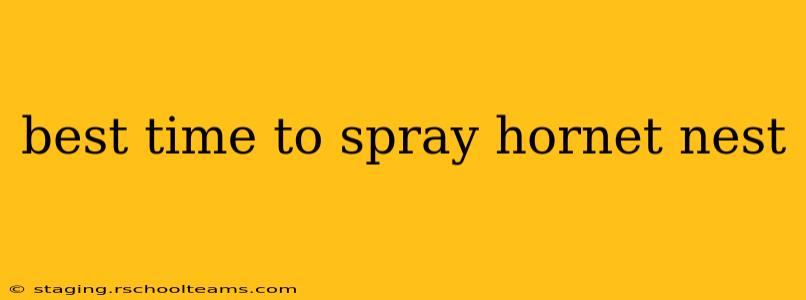Hornet nests are a serious concern, especially if they're located near your home or frequented areas. Dealing with them requires careful planning and execution to ensure your safety and the effective removal of the nest. Timing is crucial, and knowing the best time to spray a hornet nest significantly increases your chances of success and minimizes risk. This guide will explore the ideal time for hornet nest removal and provide essential safety precautions.
What is the best time of day to spray a hornet nest?
The best time to spray a hornet nest is at night. This is when hornets are less active and less likely to be aggressive. They are mostly inactive and clustered together inside the nest, making them easier to target and eliminating the risk of numerous stinging attacks. However, even nighttime spraying requires caution.
How to choose the best time of year to remove a hornet's nest?
While nighttime is ideal, the best time of year is also critical. Early spring or late autumn are generally better choices. During these periods, the colony size is smaller. Fewer hornets mean a lower risk of stings and a more manageable removal process. In the height of summer, the nests are at their largest, and the hornet population is at its peak, making removal significantly more dangerous.
Is it safe to spray a hornet nest yourself?
Spraying a hornet nest yourself is generally not recommended. Hornets are aggressive and can inflict painful stings, and multiple stings can be dangerous to some individuals. Even with careful timing and protective gear, the risks remain significant. If the nest is in a location that poses a serious threat or if you’re uncomfortable handling it yourself, it’s best to contact a professional pest control service.
What kind of spray is best for hornet nests?
Choosing the right insecticide is crucial. Look for a spray specifically designed for wasps and hornets. These products usually contain pyrethroids, which are highly effective and have a relatively fast knockdown time. Always follow the instructions on the product label carefully.
What should I wear when spraying a hornet nest?
Protective gear is essential when dealing with a hornet nest. At a minimum, you should wear:
- Long sleeves and long pants: This will protect exposed skin.
- Heavy-duty gloves: These should be thick enough to prevent stings from penetrating.
- Protective eyewear: Hornets may fly up and into your eyes.
- A beekeeping suit (recommended): Provides the most comprehensive protection.
What if I get stung?
If you get stung, immediately remove the stinger (if present), clean the area with soap and water, and apply a cold compress to reduce swelling. If you experience any allergic reaction (difficulty breathing, swelling of the face, dizziness), seek immediate medical attention.
Can I spray a hornet nest during the day?
While it’s generally not recommended, you might consider spraying a hornet nest during the day only if:
- The nest is small: A smaller nest means fewer hornets to contend with.
- You are using a powerful insecticide: This increases the chance of quick incapacitation.
- You are extremely cautious and well-protected: Appropriate protective gear is paramount.
Even with these factors considered, nighttime remains the safest and most effective option.
How long does it take for a hornet nest to be completely inactive after spraying?
After spraying the nest, allow several hours, ideally overnight, before attempting to remove it. Check to ensure all hornets are inactive before getting close.
By following these guidelines and prioritizing safety, you can significantly increase your chances of successfully and safely removing a hornet nest. Remember, if you're unsure or uncomfortable, always contact a professional pest control service. They possess the expertise and equipment to handle the situation safely and effectively.
